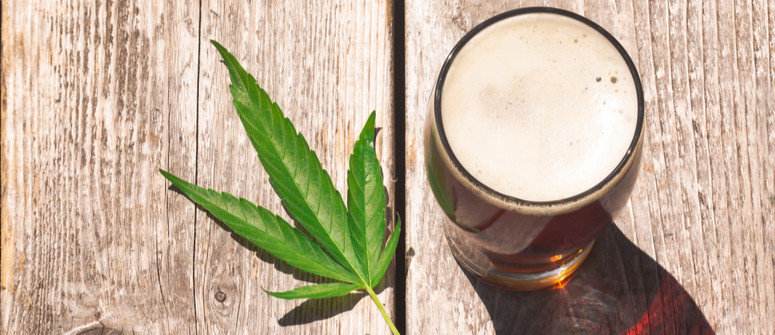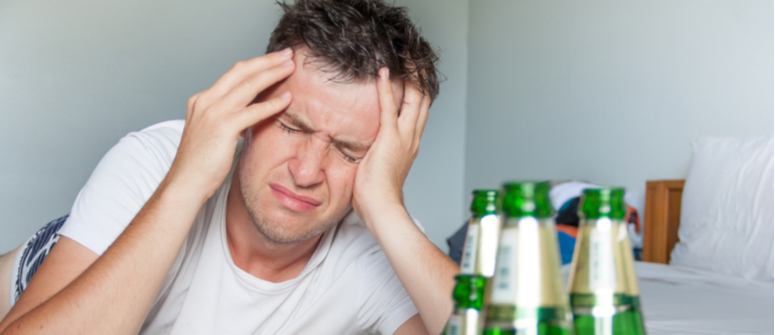Can CBD oil help cure a hangover?

Who hasn't been there? You go out, have a few shots, then a few more shots, and end up waking up with the worst hangover ever. You sip a Bloody Mary, have a big greasy breakfast, but it just won't quit. That leaves one question: have you tried CBD oil yet? It wasn't designed to cure hangovers, but many are starting to take a closer look at it.
Contents:
When you're sitting at the bar taking shots, you might know how you'll feel the next day, but you won't really care. That, of course, will lead to more shots, which will then lead to yet another killer hangover. You know the drill already; get some coffee, some greasy food, and maybe some aspirin. At some point, though, those old tricks just don't work. What can be done, then? Thankfully, your new answer isn't some gas station pill or diet. You actually might have heard of it before! Whether you have or not, we're proud to (re)introduce you to CBD oil!
WHAT ARE THE SYMPTOMS OF A HANGOVER?
Before we start exploring how CBD might help with a hangover, we should all be on the same page concerning what a hangover actually is. More specifically, we need to outline the symptoms.
What's the first thing you hear someone say when they wake up with a hangover? "Oh, man, my head!". Headaches, along with muscle aches, are probably the most common and frequently occurring hangover symptoms. You might hear that person throw up before they say anything, though, as nausea and stomach pain follow close behind. They might have slept poorly, too, and will feel fatigued and moody in turn. They might also get shaky, be really thirsty, have a rapid heartbeat, and be noticeably sensitive to light and sound.
As a result of these issues, they likely won't be able to concentrate at work, or even in a conversation. The symptoms should fade away a few hours after waking up, so it shouldn’t ruin your whole day. If you really binged the night before, however, you may in fact be out of commission for the next 24 hours.

CAN CBD OIL PREVENT HANGOVERS?
Now that you've mentally relived your worst hangover, you're probably wondering whether CBD oil can prevent the next one. To answer that question, we need to consider the science behind CBD.
Essentially, it works by supporting the function of the endocannabinoid system, which is in charge of keeping many of our physiological functions in balance. That being considered, will taking CBD oil and alcohol at the same time keep you balanced enough to avoid a hangover? Unfortunately, that's not quite how it works.
Now, it's not that it's unsafe to take them at the same time. In fact, a 1979 study on the interaction between CBD and alcohol found that the two can be taken together with no adverse effects. However, that same study found no perceivable benefits from the combo either. As it turned out, the effects of excessive alcohol intake overpowered those of the cannabinoid when the two were consumed together.
WILL CBD OIL HELP A HANGOVER?
So no, CBD won't prevent your hangover. However, that doesn't mean it won't help ease it. As CBD enthusiasts might've already noticed, the beloved cannabinoid has been observed easing many of the symptoms we described earlier.
CBD AND NAUSEA
To start off, we imagine you don't want to deal with that nausea when you wake up. Thankfully, a dose of CBD in the morning could be exactly what you need to kick it. In 2011, utilising a limited dose range, researchers observed CBD to suppress nausea and vomiting by kicking somatodendritic 5-HT1A receptors into gear. These findings have to be put into context, however, as the research was conducted on animals. Still, the observed interactions are clearly promising, and we might see more concrete findings in the near future.
CBD AND HEADACHES
Along with nausea, there's a possibility your headache could be eased by CBD as well. The evidence there, however, is a little more shaky. Specifically, the main source people turn to is a 2017 literature review of the cannabis/headache relationship. While the review doesn't focus much on CBD specifically, they describe CBD as a TRPV1 agonist. That, in slightly less complicated terms, means it might be able to inhibit the pathophysiological causes of headaches.
As Ohio State University neurologist Dr Kevin Weber notes, however, significant proof can only be found in a double-blind, placebo-controlled study of CBD itself. Until then, take whatever information you find with a grain of salt.
CBD AND SLEEP
If you're like most people, we bet the only thing you want to do when you're hungover is sleep. If you're still like most people, though, it might be hard to fall back into a restful slumber at that point. Fortunately, CBD could hold some possible answers.
This potential was most recently observed in a 2018 study performed on 72 anxiety-afflicted adults with poor sleeping habits. After regularly giving them 25mg CBD capsules, they found 66% of the participants to experience improved sleep, with 79% reporting reduced anxiety. Sure, the anxiety is a confounding factor, and we don't know whether their sleep only improved because their anxiety improved. At any rate, as stated in the conclusion, we need to see results from controlled clinical studies before moving forward.
HOW TO TAKE CBD OIL FOR A HANGOVER
"So, it's safe to consume, and it'll make my hangover less painful? Sign me up!"
If that sounds like you, you've got quite a few options at hand. We've been discussing CBD oil because it's concentrated and efficient, but there are lots of ways you can take CBD. Would you rather take an edible than put some oil under your tongue? There's no shortage of CBD-infused goodies out there. You can also find it in capsule form, and do we even have to mention all the high-CBD bud out there? No matter how you want to bring it into your routine, CBD comes in a shape or form that will work for you. All you need to do is try it for yourself!
.jpg)
.jpg)

.jpg)
